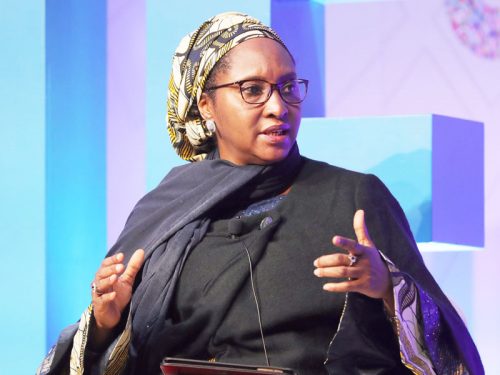Amidst outcry against frequent borrowing, the Federal Government has spoken of its plan to do more borrowings to finance the N6.258 trillion deficit in the proposed 2022 budget.
This is coming as the Federal Executive Council (FEC) approved the 2022 Appropriation Bill for an aggregate expenditure of N16.39 trillion.
The Minister of Finance, Budget, and National Planning, Mrs. Zainab Ahmed, who disclosed the council’s approval at Wednesday’s meeting presided over by President Muhammadu Buhari, maintained that government would continue to borrow to fund infrastructure projects as it does not get enough from its revenues.
She noted that Nigeria’s revenues could barely accommodate services even as she emphasized that despite the concerns, its borrowings are still acceptable limits
She said: “If we just depend on the revenues that we get, even though our revenues have increased, the operational expenditure of government, including salaries and other overheads, is barely covered or swallowed up by the revenue. So, we need to borrow to be able to build these projects that will ensure that we’re able to develop on a sustainable basis.
“Nigeria’s borrowing has been of great concern and has elicited a lot of discussions. But if you look at the total size of the borrowing, it is still within healthy and sustainable limits. As of July 2021, the total borrowing is 23% of GDP,” she said.
Responding to questions, she further justified the plan for more borrowing, arguing that “Government has been borrowing before this administration and continues to borrow and it is important that we borrow to provide developmental projects in the form of roads, rails, bridges, power, and water for sustainable development in this country.
“If we just depend on the revenues that we get, even though our revenues have increased, the operational expenditure of government, including salaries and other overheads, is barely covered or swallowed up by the revenue. So, we need to borrow to be able to build these projects that will ensure that we’re able to develop on a sustainable basis.
“Nigeria’s borrowing has been of great concern and has elicited a lot of discussions, but if you look at the total size of the borrowing, it is still within healthy and sustainable limits. As at July 2021, the total borrowing is 23% of GDP. When you compare our borrowing to other countries, we’re the lowest within the region, lowest compared to Egypt, South Africa, Brazil, Mexico, the very lowest, and Angola.
“We do have a problem with revenue. Our revenues have been increasing. We just reported to Council that our revenue from non-oil has performed, like July, at the rate of 111%, which means outperforming the prorated budget. But our expenditure, especially staff emoluments have been increasing at a very fast rate making it difficult to cope with funding of government.
“So, what we have to do is a combination of cutting down our cost, as well as increasing revenue to be able to cope with all that is required for the government to do, including salaries, pensions debt service, as well as capital expenditure,” Ahmed said.
The minister said that FEC noted the changes in the 2022-2024 fiscal projections based on the implementation of the Petroleum Industry Act 2021 and other necessary expenditures that should be accommodated in the 2022 Budget.
She also disclosed the key assumptions and targets underlying the budget provisions including Oil price – $57 per barrel; Oil production – 1.88 mbpd; Exchange rate – N410.15/US$; Oil Revenue – N3.15 trillion and Non-Oil Revenue – N2.13 trillion.
Others she gave are Federal Government’s Independent Revenue of N1.82 trillion; Total Projected Federal Government Revenue of N10.13 trillion; Debt Service of N3.61 trillion; Statutory Transfers of N768.28 billion (including N462.53 billion capital component) and personnel costs and Pensions of N4.69 trillion; (inclusive of N617.72 billion for the 63 GOEs).
The rest are Overhead costs of N792.39 billion (inclusive of N451.0 billion for the 63 GOEs); and Capital expenditure (inclusive of capital component of Social Investment Programme, capital in Statutory Transfers, capital of 63 GOEs, Capital Supplementation as well as Grants and Donor funding) of N5.35 trillion(inclusive of N647.08 billion for the 63 GOEs).
“The resultant deficit of N6.258 trillion which will be financed by new borrowings of N5.012 trillion (of which domestic – N2.506 trillion and foreign – N2.506 trillion); drawdowns on Project-tied Multilateral/Bilateral loans – N1.156 trillion; and Privatization Proceeds of N90.73 billion,” she stated.
On the approved 2022 Appropriation Bill for an aggregate expenditure of N16.39 trillion for 2022, she gave the components as the adjustments to the Medium-Term Fiscal Framework 2022- 2024; Statutory Transfers of N768.28 billion and Debt Service of N3.61 trillion and Sinking Fund for Maturing Debts of N292.71 billion Naira.
Other are Recurrent Expenditure (Non-Debt) of N6.83 trillion, inclusive of N350.0 billion for the recurrent component of Social Investment Programme; and Aggregate Capital Expenditure of N5.35 trillion, inclusive of GOEs’ capital expenditure, multilateral/bilateral loan funded projects, Capital Supplementation and Grants/Aid funded projects.
According to her, this represents 33% of the expenditure budget. Ahmed said President Buhari was intent on leaving improved agriculture production as just a legacy, adding: “Currently, the agriculture sector contributes 23% of the GDP. We have a record of expanding the agricultural value chain; we’ve had very little or no processing in agriculture until this administration.
“We now have a very large number of fertilizer blending plants, about 42, that are operating at full capacity. We also have a large number of rice mills that didn’t exist before. We have a lot of Nigerians that have taken up agriculture as a business, but apart from agriculture, the President is also rolling out rail lines, some of which had been started several years ago, have been completed.
“The Lagos/Ibadan rail line is now put to use. We all know about the Abuja/Kaduna and also the Itakpe/Warri rail line has been completed. Work has kicked off on the Kano to Kaduna end of the Lagos/Kano/Ibadan rail line. So, Mr. President wants to leave these rail lines. Rail is very important because it is a major means of moving goods across the country. When the rail lines are completed, it will provide much-needed relief in terms of the movement of goods that our roads now suffer by the use of trucks.
“We are also investing in the deployment of major roads. Some of them are completed, some are at various levels of completion. There’s also the 2nd Niger Bridge that is also going to be completed during the tenure of this administration. The major projects that I just mentioned are fully provided for in the budget. The Federal Ministry of Works and Housing has a provision of N388 billion; the Power sector has about N377 billion; the Ministry of Agriculture has N98 billion; the Transportation Ministry has N189 billion.
“So, all the major projects are being provided for. The target is to make sure that we have some of these key projects completed and commissioned during Mr. President’s tenure,” she added.
On the difference between the price of crude oil and the $57 benchmark for the 2022 budget, the minister pointed out: “You know that the crude oil price in the international capital market is not stable, it goes up and it comes down. Our assessment is that $57 per barrel is a safe zone to be in and we did this after extensive consultations with CBN, we checked the research work of the World Bank and other institutions, whose concern is investigating and researching crude oil prices. But you know, the revenue in the budget for oil and gas is a function of the level of production as well as the price.
“We had suffered some setbacks in terms of the level of production, occasioned by the limits that the OPEC set. But thankfully, OPEC has changed our quota and that will also soon ramp up. In the event that revenues from oil and gas outperform the budget, there is always the safeguard that the excess goes into the Excess Crude Account. If that happens, we have not witnessed that in the past one and a half years because the revenues have been very cyclical,” the minister concluded.
(Nigerian Tribune)

 BIG STORY4 days ago
BIG STORY4 days ago
 BIG STORY4 days ago
BIG STORY4 days ago
 BIG STORY4 days ago
BIG STORY4 days ago
 BIG STORY3 days ago
BIG STORY3 days ago
 BIG STORY3 days ago
BIG STORY3 days ago
 BIG STORY4 days ago
BIG STORY4 days ago
 BIG STORY1 day ago
BIG STORY1 day ago
 BIG STORY3 days ago
BIG STORY3 days ago
























